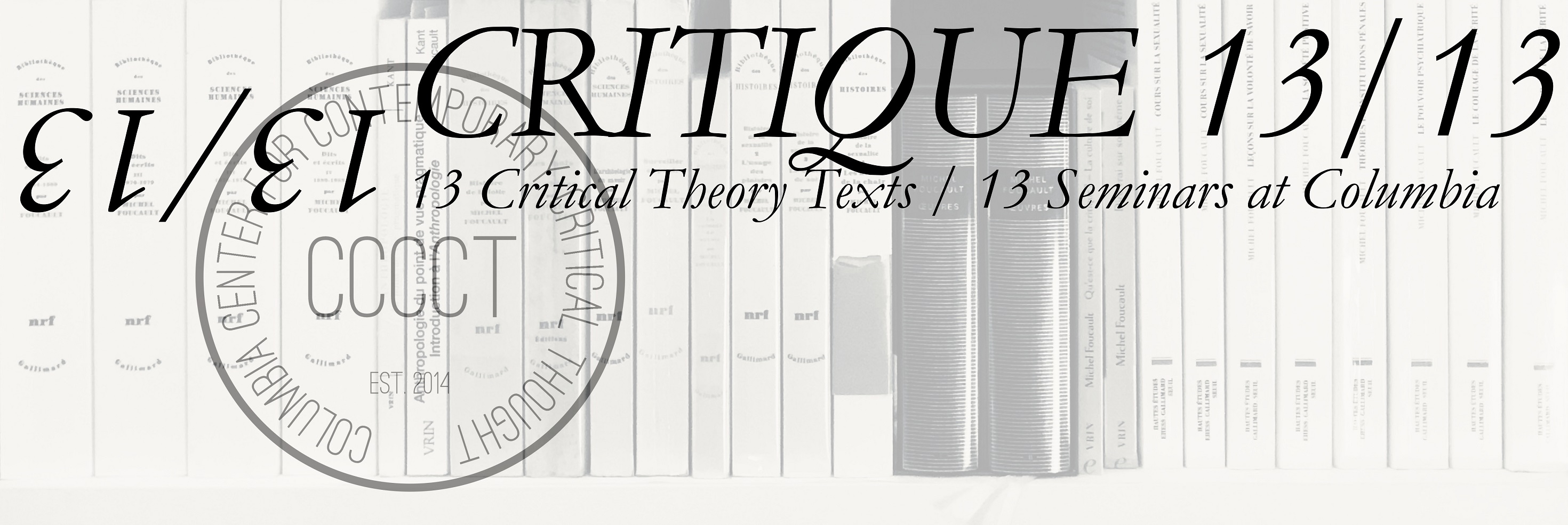By Sharon Liu*
The Columbia Center for Contemporary Critical Thought kicked off the first seminar of Critique 13/13 with Professor Amy Allen, in a discussion about the current state of critical theory and its usefulness today. The questions at the heart of the seminar were: What does it mean to return to these texts? What is the most productive way to read critical texts and authors? In articulating answers to these questions, the discussants shed light on the present state and potential transformations of critical theory and articulated the search for a “method.”
Professor Allen started the seminar by advocating a radical rethinking of history. She argued that the long-running debate over whether Michel Foucault should be considered a historian or a philosopher misses the point of his work. Foucault’s aim was to historicize radical possibilities of transcendental thoughts and action: “[Foucault’s] historicization of History also involves an attempt to break out of this conception of history…using historical means, that is, by radically transforming that conception from within.”[1] Foucault read history as “one damn thing after the other,” as a discontinuous process of moving events, and he did so in order to dislodge the idea of History as a progressive, teleological, rational formation upon us—which he saw as the modern historical a priori. Professor Allen then used Colin Koopman’s How We Became Our Data to affirm the continued relevance of Foucault’s project and the need for a genealogy of the present and for new concepts of power—such as data power and infopower. Thus for Professor Allen, our method must be working through the past as a way to fix the present.
In his remarks, Professor Harcourt pointed out that Professor Allen placed a lot of pressure on the “toolbox” metaphor. He stressed that these critical theories and texts are not “tools in a box” for us to pick up and use as we see fit. Nothing exists in a pre-formed way. After rejecting the toolbox metaphor and questioning the use of endlessly contextualizing and “biographizing” these authors, Professor Harcourt posed three questions to the discussants: Is there something unique in Nietzsche’s or Foucault’s writing that should lead us to treat them differently? Is it necessary for one to get these texts “right”? And finally, can we illustrate what this method would look like?
Professor Harcourt went on to point out that if there are infinite interpretations to a text, then we can never get anything “right.” The desire to be faithful to the texts places undue emphasis on reason and fails to account for relations of power and desire. This leaves us with an unstable feeling and a difficult question: what should we draw from the fact that Trump is one of the greatest interpreters today? Professor Harcourt’s answer to his own question was that we should move away from asking whether an interpretation is right and instead ask: can I come up with an interpretation that serves my political projects?
After engaging with these Critique 1/13 texts in the discussion seminar, I realized I had to return to Foucault’s “Nietzsche, Genealogy, History” one more time to understand how to move forward. Foucault states that traditional history’s focus on capturing the origin fails because it presumes specific conditions in the past that have continued to the present. In contrast, genealogy recognizes the different interpretations inherent in history: it is always too late to recover an original meaning and a stable context. For Foucault, historical investigation should be thought of as an “unstable assemblage of faults, fissures, and heterogeneous layers that threaten the fragile inheritor from within or from underneath.”[2] By identifying emergence rather than origin as the key unit of analysis, he proposed the method of genealogy, an effective history that does not extract under the surface of history to find hidden meanings, but that records the emergence of different interpretations.[3] Foucault sought to trace the erratic and discontinuous process whereby the past becomes the present, and in doing so, to demonstrate that knowledge is perspective—not truth.
I was invigorated by the opening discussion of Critique 13/13. By raising the questions of “rightness” and fidelity to the text, it helped us understand that there can be no ultimate meaning or secure interpretations. We do not need to rely on the authors for the “truth”; instead, we should turn back to their texts and figure out how they can help today (presentism vs. historicism). One might ask: what are the dangers of getting the texts wrong? How does error play out in critical theory? Professor Allen responded by returning to the method of genealogy, and how it rewrites history in order to problematize the present. We must reread the texts to start a dialogue with them; dialogical reading means being truthful to one’s own convictions and not just submitting to the authority of the text or the author. Or to put it slightly differently: genealogy dispenses with the worry of getting things wrong by questioning the assumption that they can be gotten right in the first place.
Critical theory, as Professor Allen recognized, is different from philosophy in that critical theorists already have a side: anti-authoritarianism. To understand emancipatory praxis, questions of method and “tools” are critical, but we must never forget that this is personal. Returning to Professor Harcourt’s manifesto, we must each ask ourselves, what more can we do? Can I make an interpretation that can better serve my political projects? How can we deploy these texts to address our crises? I am excited to continue exploring these questions in the coming Critique 13/13 seminars.
Notes
* M.A. Global Thought Columbia University (2020), Hamilton College (2017).
[1] Amy Allen, “‘Psychoanalysis and Ethnology’ Revisited: Foucualt’s Historicization of History,” The Southern Journal of Philosophy, Vol. 55, Spindel Supplement, 2017:33.
[2] Michel Foucault, “Nietzsche, Genealogy, History.” In The Foucault Reader, ed. Paul Rabinow, 76-100. New York, Pantheon Books, 1984, 82.
[3] Ibid., 86.
